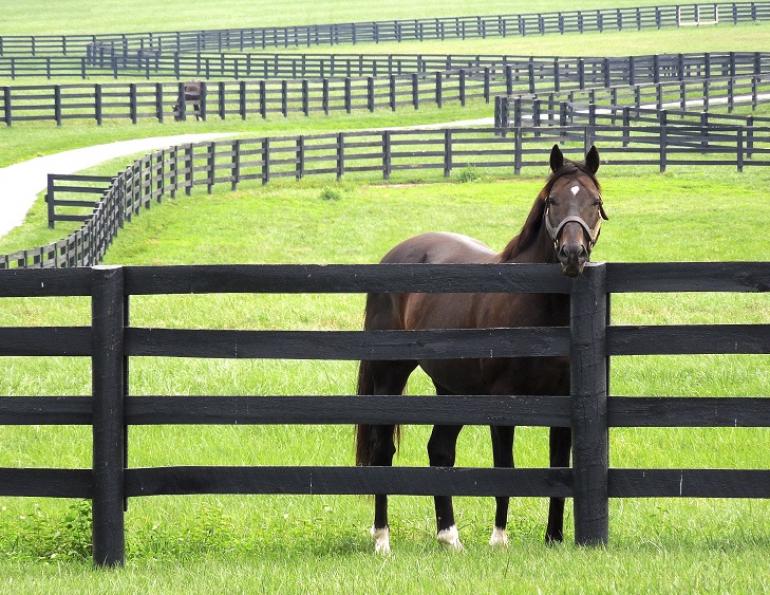Horses come in a variety of breeds, sizes, dispositions, and temperaments, and no single type of fence is appropriate for all of them and that is why there are various horse fencing options available in the market. That’s why it is ideal to choose the best fencing for horses that goes with tall as well as short heighted horses.
Understanding the many types of fences is critical for selecting the best fence for your horse's safety and security, whether in a grazing corral, training area, show area, or other facilities. One of your aims, regardless of fence material or design, should be to present a smooth side to the horses. Do-it-yourselfers sometimes make the error of installing boards on the outside of fence posts, allowing horses to easily knock them loose.
Furthermore, a horse running down the fence line may be injured by the exposed posts. You may not be able to avoid this exposure with cross-pasture fencing; in such circumstances, employing an electric fence wire to create a psychological as well as a physical barrier is a safe alternative.
Safety Measures for Horses with Huge Topline
Building codes may eventually decide your land's fencing needs, but there are some fundamental guidelines that apply almost everywhere. The height of field fences should be between 54 and 60 inches above ground level.
The horses can exit your premises, so err on the side of caution and go with a 5-foot minimum height. Stall runs and paddocks should be at least six feet tall. An opening of 8 to 12 inches at the bottom will prevent feet and legs from becoming trapped, as well as foals from rolling under the fence. Fence gaps should be either large enough to prevent a hoof, leg, or even the head from becoming trapped, or small enough to prevent a hoof from entering (no more than 3 inches by 3 inches).
Most fabric and high-tensile smooth wire fences require triangular-shaped bracing at the corners and at intervals of about 1/8 mile to sustain tension. If the horse can reach the acute angles generated by bracing wires, they can become entrapment dangers; careful construction (such as using boards in corners to limit access) can prevent harm, even death.
Horses can be fenced with a variety of different types of fences. Before committing to one style of the fence, think about if it's right for your horses, your property, and your overall needs.
Table of Contents
1. Fencing Made Of Wood
Wood fencing is tried and tested, and it has a long history of providing good horse fencing. It's difficult to go wrong with some thick oak or comparable timber boards. This material is highly durable, so if you construct your fences properly, they will last a long time.
Furthermore, wood is highly noticeable, and your horse will not run into it by accident. Granted, it's not the most inexpensive material, and wood costs have been steadily rising in recent months. Wood also deteriorates over time due to weather and your horses' chewing, so you'll have to replace boards frequently and perform a lot of basic upkeep and maintenance.
2. Electric Horse Fence
Electric fences are the low-cost horse fencing options. These are also reasonably simple to build. In addition to being effective as a physical deterrent, electric fences can also be used as a psychological deterrent. Due to the painful shock, they deter horses from leaning or chewing on fence lines. Horses learn to avoid the "hot" fence quickly—usually after only one experience.
Electric fencing is in high demand. People want to protect not only their cattle but also their current fences from being destroyed by livestock. Electric fencing is a safe and environmentally friendly option. Paint does not leech out, and animals will not chew it, thus no chunks, shards, or other problems are formed.
It's utilized in pastures to safeguard watercourses and is easily put on plastic posts that don't decay, corrode, or pollute.
3. PVC Fencing
PVC fencing will not rot in the weather and will not be chewed up by your horses. It's virtually waterproof, and it may even mimic the look of a wood fence without the upkeep and effort. Of course, PVC comes in a variety of colors, including all-white and even some other hues, allowing for quite attractive aesthetics with no upkeep.
However, this is one of the most expensive ways to build a fence. Worse, these boards are engineered to break under pressure, and once your horses understand this. They'll likely walk straight through them, which is why most PVC fences are used in conjunction with electric fencing.
4. Wire Fences
Simply strung wire fences without electrical current are simple to install and one of the least expensive fences. But they have a high risk of horses becoming tangled in the wires, resulting in dangerous injuries.
These fences are less apparent than other types of barriers. And they may need to be tightened on a regular basis as they become loosened as a result of impacts and other interruptions.
5. Mesh Fences
One of the horse fencing options is the simple strung wire fences are far less durable than wire mesh, and provided the wire is spaced properly – no more than 2-4 inches between wires – there is little possibility of the horse becoming stuck or twisted.
The ideal mesh is diamond-shaped, but the rectangular mesh is equally good. The mesh is more visible to horses than individual wires, making these fences more lasting.
So, What’s The Best Fence?
While there are various varieties of fencing to choose from, horse owners who are knowledgeable about each type may simply select the appropriate fence for their horse's needs. Electric fencing for horses can be one of the best fencing options for tall horses as well as small horses. For finding the best fencing contractors navigate a directory such as the Topspot101.

